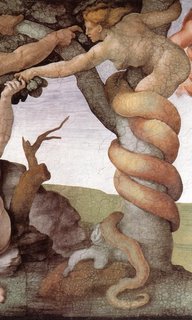The LORD God then took the man and settled him in the garden of Eden, to cultivate and care for it. The LORD God gave man this order: "You are free to eat from any of the trees of the garden except the tree of knowledge of good and bad. From that tree you shall not eat; the moment you eat from it you are surely doomed to die." * * *
Now the serpent was the most cunning of all the animals that the LORD God had made. The serpent asked the woman, "Did God really tell you not to eat from any of the trees in the garden?"
The woman answered the serpent: "We may eat of the fruit of the trees in the garden; it is only about the fruit of the tree in the middle of the garden that God said, 'You shall not eat it or even touch it, lest you die.'"
But the serpent said to the woman: "You certainly will not die! No, God knows well that the moment you eat of it your eyes will be opened and you will be like gods who know what is good and what is bad."
The woman saw that the tree was good for food, pleasing to the eyes, and desirable for gaining wisdom. So she took some of its fruit and ate it; and she also gave some to her husband, who was with her, and he ate it. Then the eyes of both of them were opened, and they realized that they were naked; so they sewed fig leaves together and made loincloths for themselves.
 Planned Parenthood of S.E. Pa. v. Casey, 505 U.S. 833 (1992) --
Planned Parenthood of S.E. Pa. v. Casey, 505 U.S. 833 (1992) --Our cases recognize "the right of the individual, married or single, to be free from unwarranted governmental intrusion into matters so fundamentally affecting a person as the decision whether to bear or beget a child." Our precedents "have respected the private realm of family life which the state cannot enter." These matters, involving the most intimate and personal choices a person may make in a lifetime, choices central to personal dignity and autonomy, are central to the liberty protected by the Fourteenth Amendment. At the heart of liberty is the right to define one's own concept of existence, of meaning, of the universe, and of the mystery of human life. Beliefs about these matters could not define the attributes of personhood were they formed under compulsion of the State.* * * The destiny of the woman must be shaped to a large extent on her own conception of her spiritual imperatives and her place in society.
No comments:
Post a Comment